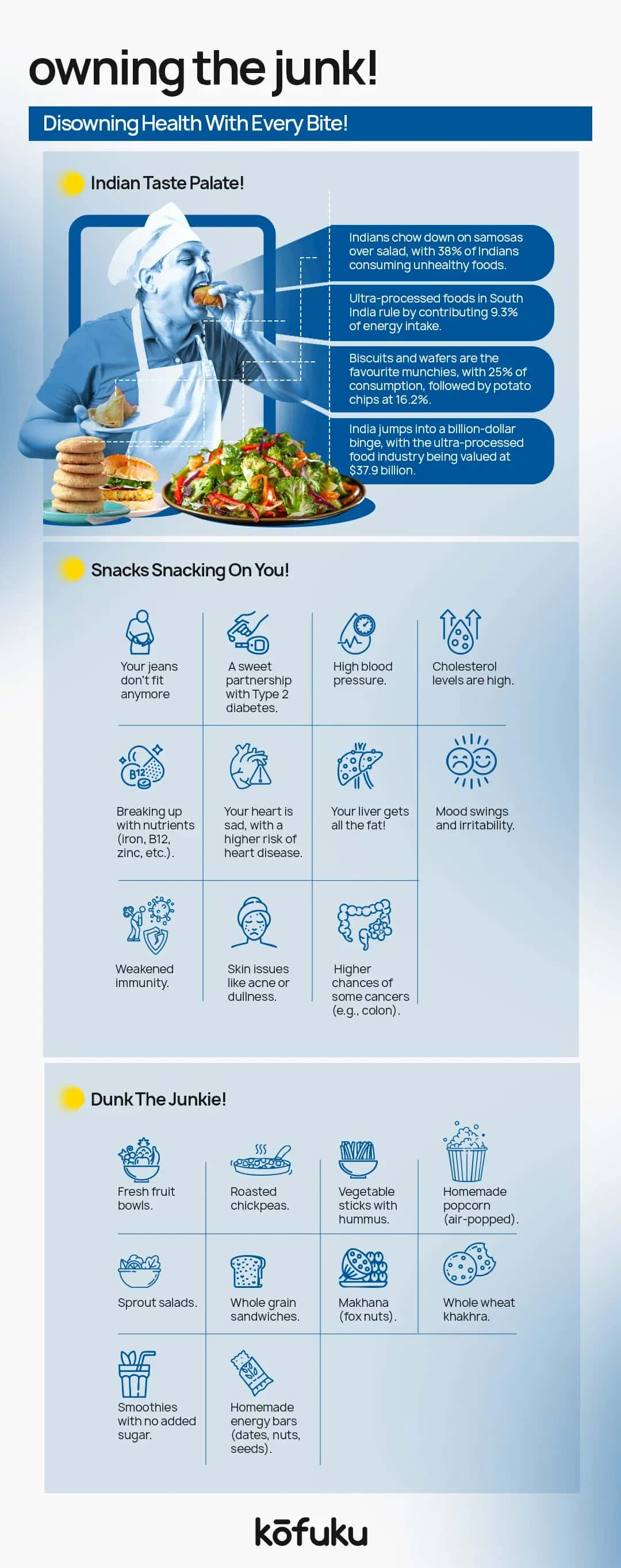Home
Blogs
Wellness Corner
Not All Plant-Based Diets Are The Same: Junk Veggie Food And Its Impact On Health
Not All Plant-Based Diets Are The Same: Junk Veggie Food And Its Impact On Health

Introduction
Vegan this, veggie that, every time you open Instagram, you see a new vegan recipe or a new vegan restaurant in your area. Scores of people are flocking towards veganism like it’s a new religion, and for good reason!
Veganism boasts some really healthy food. Unfortunately, there seems to be a consensus that all vegan food is healthy and ethically sourced. While vegan innovations like soy chicken and vegetarian options like aloo burgers make it easier than ever to adopt a plant-based diet, they also raise an important question: Are all vegetarian foods truly healthy?
The reality is that not all plant-based diets are created equal. It's just like how eating a full meat shawarma after your gym session isn’t going to help you cut and build muscle.
While whole vegetable and vegan foods like fruits, vegetables, dal, and nuts offer many health benefits, the increasing availability of highly processed plant-based alternatives has led to a surge in “junk veggie food.”
These ultra-processed options often contain artificial additives, too much sodium, unhealthy fats, and refined sugars, which can be harmful.
Understanding Junk Vegan Food
In the simplest way, junk vegan food is highly processed plant-based products that lack essential nutrients and contain excessive unhealthy additives. Just because a food item is labelled “vegan” or “plant-based” does not mean it is inherently good for your health. In fact, many plant-based processed foods are nutritionally comparable to traditional junk food.
Some common examples of junk veggie food include:
-
Plant-based burgers and sausages – Many times made with highly processed soy, pea protein isolates, and artificial flavor enhancers.
-
Vegan cheeses and spreads – Frequently high in refined oils and stabilizers but lacking in protein and nutrients.
-
Meat substitutes – While these offer a cruelty-free alternative to meat, they are usually highly processed and loaded with sodium.
-
Vegan snacks and desserts – Cookies, chips, and cakes labeled as “plant-based” usually still contain high amounts of sugar, refined flour, and preservatives.
-
Flavored oat, almond, or soy milk – Some plant-based milk alternatives contain over 10g of added sugars and synthetic vitamins instead of natural nutrients.
Many people assume that adopting a plant-based diet automatically leads to better health. However, replacing animal products with heavily processed plant-based foods can have some bad effects, such as:
Increased Risk of Nutrient Deficiencies
Whole plant-based foods provide essential vitamins, minerals, and fiber, but highly processed plant-based alternatives often lack even the basic nutrients. Common deficiencies in junk plant-based diets include:
-
Vitamin B12 – Absent in most plant foods, requiring supplementation.
-
Iron – Found in plant sources but often less bioavailable than heme iron from animal products.
-
Omega-3 Fatty Acids – Lacking in many processed plant-based diets unless supplemented with sources like flaxseeds and walnuts.
-
Protein – While whole plant foods provide protein, highly processed alternatives may not always be the best source.
High Levels of Sodium and Preservatives
Many plant-based processed foods, particularly meat substitutes and dairy alternatives, contain extra sodium, artificial preservatives, and stabilisers to mimic the taste of traditional food. Many studies have shown that high sodium intake is linked to increased blood pressure and a higher risk of heart disease.
Added Sugars and Refined Carbohydrates
Vegan cookies, cereals, and energy bars usually contain high amounts of added sugars and refined grains, leading to blood sugar spikes and an increased risk of obesity and type 2 diabetes. And the ones that don’t, are usually very expensive.
Unhealthy Fats and Additives
Many plant-based processed foods rely on refined vegetable oils, trans fats, and emulsifiers to improve its texture and taste. These ingredients contribute to inflammation, weight gain, and metabolic disorders.
Poor Gut Health
Whole plant foods are naturally rich in fiber, which promotes gut health by feeding beneficial bacteria. In contrast, processed plant-based foods often lack fiber and contain artificial ingredients that can disrupt gut microbiota, leading to digestive issues and weakened immunity.

The Benefits of a Whole-Food Plant-Based Diet
Instead of relying on processed plant-based foods, a whole-food plant-based (WFPB) diet prioritises natural, nutrient-dense ingredients that offer substantial health benefits, including:
-
Lower risk of chronic diseases – Studies show that whole plant-based diets reduce the risk of heart disease, diabetes, and certain cancers.
-
Improved digestive health – High-fiber foods like beans, lentils, and whole grains support a healthy gut microbiome.
-
Better weight management – Whole plant foods are naturally lower in calories, and studies have shown that they satiate us better than non-vegan food.
-
Reduced inflammation – Nutrient-dense foods contain antioxidants that combat inflammation and oxidative stress.
How to Make Healthier Plant-Based Choices
If you are adopting a plant-based diet, remember that the foods you choose can make a significant difference in your overall health. Just because you’re vegan now doesn’t make you automatically healthy. Here are some tips to avoid junk veggie food and actually make sure you’re buying healthy vegan food:
Read Ingredient Labels
When you’re purchasing packaged plant-based foods, check ingredient lists for:
-
Less processed – Choose products with whole ingredients rather than isolates and additives.
-
No added sugars – Opt for unsweetened plant-based dairy alternatives.
-
Lower sodium – Processed foods can be high in salt, so look for low-sodium options.
Prioritise Whole Foods
Base your diet on nutrient-dense, unprocessed plant foods like:
-
Fresh vegetables and fruits
-
Whole grains (quinoa, brown rice, oats)
-
Soya, Dal, Channa and other legumes
-
Nuts and seeds (almonds, cashews, flaxseeds)
-
Healthy fats (avocados, extra virgin olive oil, tofu)
Limit Processed Meat Alternatives
While plant-based meats can be convenient, eat them in moderation and choose those with cleaner ingredients like mushrooms, jackfruit, or lentils instead of highly processed soy protein isolates.
Eat Indian Food
Desi food is vegan heaven! From Dosa and Chutney to Chole Bhature, if you’re Indian, it’s very easy to transition to vegan food! Stick to your roots and you can eat processed vegan food during your cheat days. It’s the ultimate vegan food hack
Make Homemade Meals
Cooking your meals puts you in control and you don’t have to eat ultra processed food for the sake of it being vegan. Simple plant-based meals such as stir-fried veggies, oats, and a plethora of Indian food offer better nutrition than store-bought processed foods.
Supplement Wisely
Since some nutrients are harder to get from a plant-based diet, you can get your daily dose of B12, omega-3s, and vitamin D from supplements. If you’re finding it hard to hit your protein count, you can opt for vegan whey protein as well!

Conclusion
The popularity of vegetarian and vegan food is a step in the right direction, but the problem lies in its commercialisation. Just because a product is labeled “vegan” or “plant-based” doesn’t mean it’s good for you. The key is to make informed choices because not all plant-based diets are the same.
FAQs
Q. Is it healthy to follow a vegan diet?
A. Not necessarily. While a vegan diet can be healthy when based on whole foods like fruits, vegetables, legumes, and whole grains, relying heavily on processed vegan products can be just as unhealthy as a typical junk food diet.
Q. Does junk vegan food exist? What is it?
A. Junk vegan food refers to processed plant-based products that are high in sodium, added sugars, unhealthy fats, and artificial additives.
Q. How can I tell if a vegan product is healthy?
A. Check the ingredient label! Look for products with whole ingredients, low sodium, no added sugars, and minimal preservatives.
Q. Can I still eat plant-based meat substitutes?
A. Yes, but in moderation. Occasional consumption is fine, especially when you're transitioning into a plant-based lifestyle.
Q. What are the key nutrients to watch out for on a plant-based diet?
A. Some essential nutrients that may be lacking in a plant-based diet include vitamin B12, iron, omega-3 fatty acids, and protein.


Potassium-Rich Diet Tips to Boost Your Nutrient Levels

The Era of Nutrition Apps

Is Veganism a Healthy Choice or Just a Fad Trend?

The Legend Behind Protein Powders – Fact vs. Fiction

Supplements Don’t Solve Nutritional Imbalances – Learn Why


